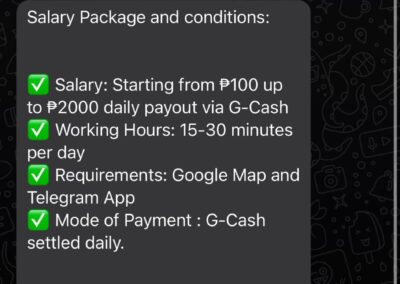Beware of Remote Job Scams
Don’t Pay to Play!
In today’s digital age, the allure of remote work has never been stronger. The idea of working from the comfort of your home, setting your own hours, and escaping the daily commute is undeniably appealing. However, amidst the legitimate remote job opportunities, there exists a dark underbelly of scams that prey on job seekers’ eagerness to find their dream remote job. One of the most common red flags in these scams is the demand for money upfront. In this blog post, we’ll explore the dangers of remote job scams that ask for money and provide you with tips on how to spot and avoid them.
The Red Flags
-
Upfront Payment: Legitimate employers don’t ask for money from job applicants. If a potential employer demands any form of payment, whether it’s for training materials, background checks, or job listings, be extremely cautious.
- Too Good to Be True: High-paying remote job offers that seem too good to be true often are. Scammers use these enticing offers to lure in unsuspecting job seekers.
- Unprofessional Communication: Watch out for poorly written job postings, emails, or websites. Many scams have spelling and grammatical errors, and the communication may be unprofessional.
- Anonymous Employers: Legitimate companies will provide clear contact information and a professional online presence. Scammers often hide behind anonymity, making it difficult to verify their legitimacy.
- No Interview or Evaluation: A genuine remote job opportunity will involve some form of interview or evaluation process to assess your skills and qualifications. Be wary of job offers without any assessment.
-
Vague Job Descriptions: Scam job postings often lack specific details about the job responsibilities, qualifications, or company information. If the posting is vague, proceed with caution.
We have included a selection of example screenshots below
Avoiding Remote Job Scams
-
Research the Company: Before applying for any remote job, thoroughly research the company. Check their website, read reviews, and verify their contact information. Legitimate companies have a digital footprint.
-
Trust Your Instincts: If something doesn’t feel right about a job posting or communication with a potential employer, trust your instincts. It’s better to be safe than sorry.
-
Never Send Money: Under no circumstances should you send money to a potential employer. Legitimate companies cover hiring costs, not the other way around.
-
Use Trusted Job Platforms: Stick to reputable job search websites and platforms. These platforms often have measures in place to vet employers and job listings.
-
Be Wary of Unsolicited Job Offers: If you receive an unexpected job offer, be cautious. Scammers often reach out to job seekers without any prior application.
-
Ask Questions: Don’t be afraid to ask questions about the job, company, and hiring process. Legitimate employers will be happy to provide information
While remote work offers incredible flexibility and opportunities, it’s essential to remain vigilant when searching for remote job opportunities. Scammers who ask for money prey on job seekers’ aspirations and can cause financial and emotional harm. By recognizing the red flags and following the tips outlined in this blog post, you can protect yourself from falling victim to remote job scams. Remember, a legitimate remote job should never require you to pay to play.








